All Nonfiction
- Bullying
- Books
- Academic
- Author Interviews
- Celebrity interviews
- College Articles
- College Essays
- Educator of the Year
- Heroes
- Interviews
- Memoir
- Personal Experience
- Sports
- Travel & Culture
All Opinions
- Bullying
- Current Events / Politics
- Discrimination
- Drugs / Alcohol / Smoking
- Entertainment / Celebrities
- Environment
- Love / Relationships
- Movies / Music / TV
- Pop Culture / Trends
- School / College
- Social Issues / Civics
- Spirituality / Religion
- Sports / Hobbies
All Hot Topics
- Bullying
- Community Service
- Environment
- Health
- Letters to the Editor
- Pride & Prejudice
- What Matters
- Back
Summer Guide
- Program Links
- Program Reviews
- Back
College Guide
- College Links
- College Reviews
- College Essays
- College Articles
- Back
The Arab Woman
It’s 8 am, and here in New York City a woman stands in line waiting to pay for her morning boost of caffeine. Her Prada pumps tap the floor in a quick rhythm. She glances at her Blackberry as her cheeks puff from annoyance. She’s going to be late.
Halfway across the world, in Mecca, Saudi Arabia, a woman dressed from head to toe in black, wears the burka as a sign of her responsibility as a woman and a Muslim. She stares at the pot cooking right in front of her, nervous, for if the meal doesn’t turn out perfect, she will be beaten again, lost under the layers of oppression.
The brunette woman steps out of the elevator. She takes off her shoes in the middle of the hallway, as she loses about 4 inches. She tiptoes into her apartment, careful, not to make the door creak. A small gift-bag in hand, she enters. “Happy Birthday, baby,” she exclaims, as she leans over to kiss her boyfriend.
Trying to hide her frustration under the black mask that covers her face, the woman hears her husband come home, a little later than usual. “I’m hungry,” he announces. She nervously brings his plate to the wooden table, hoping the food isn’t cold again. She doesn’t want another beating.
It’s not fair to say that Middle Eastern States haven’t fully developed the idea of feminism and all out “girl power,” as even US hasn’t fully emerged into a socially equal culture. Rather, the Islam law inflicted upon all women exemplifies a sense of eternal masculinity. The fate of women is pre-determined according to Islam law and its historical context of a male-dominant religion. That is not to say there is the idea of a weaker sex, rather the idea of an untamed gender in need of supervision at all times. As a result, females are subject to men, and have developed a sense of timidity and fear. They would rather mold themselves to the harsh and rigid religious austerity they have been put under, than disobey what has become an over-set ideology of rules.
The regulations imposed on women under the Taliban, a fundamentalist Islamic body of government, suggest not only moral abuse, but physical exploitation as well. The Muslim religion itself requires total devotion and embracement, where if any implication of non-Islam behavior is displayed, one could be killed. Only recently in 2009 was a young Afghani woman’s nose and ears cut off for running away from her arranged marriage. Aisha Bibi, originally intended to be left to die, is still alive and considered a role model for all other Islamic women being suppressed. She was able to stand up to her authority figures, despite the consequences she knew she’d have to face.
While some people may look at Islam law as a step back in culture, I see this as a chance to develop what was originally intended to be a basic government. The Middle East has chosen to express their religion within their government, asserting severe standards as laws. The Islam religion was founded as the notion of serving under God, Allah, and promoting peace and harmony within oneself through the Qur’an. Unfortunately, as all religions leave room for unanswered questions, unquestioned answers, reformists and extremists- the Islam religion has received the spotlight as a fundamentalist religion. I personally see the Arab woman as a strong, beautiful woman. This woman has dealt with abuse, dealt with oppression, dealt with one identity, dealt with suppression against who she would like to be, to live in the society she does. It is people like her, people like Aisha Bibi that make me understand truly how strong a woman is.
Aisha Bibi, you are my hero.
She turned around, covered head to toe in black, to see her husband enter the door. “I’m hungry,” he announced. She set his plate on the table confidently. “I’m leaving,” she told him. “I’m initiating a divorce.”

Similar Articles
JOIN THE DISCUSSION
This article has 1 comment.
